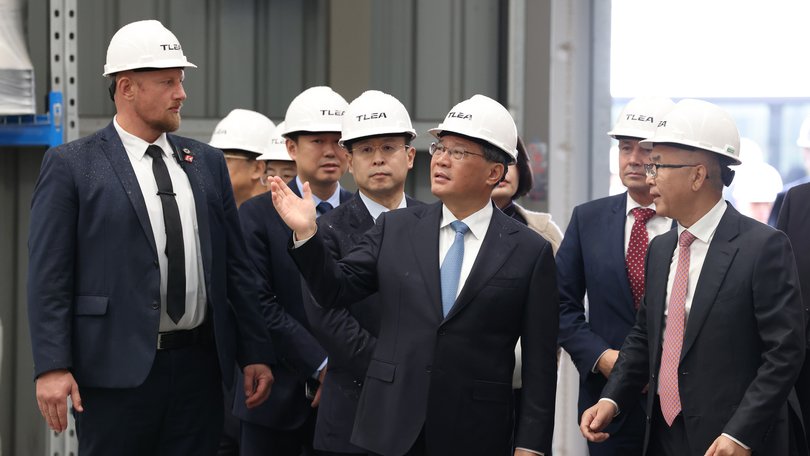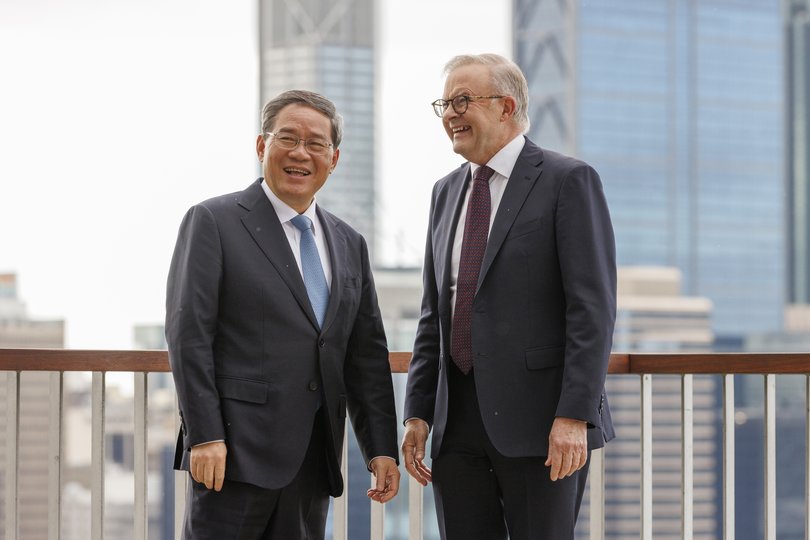Li Qiang: China’s development is not a threat to Australia

China’s second-highest leader has urged Australia to see his nation’s development as an opportunity, not a threat, as he wrapped up a three-day visit by focusing on critical minerals and green energy projects powered by Western Australia.
But there was no relief for WA’s lobster exporters who are still holding out hope China will lift restrictions on Australian crayfish — the final barrier in the $320 billion trading relationship.
Premier Li Qiang saw tonnes of lithium hydroxide being packaged in a Tianqi warehouse in Kwinana and got the hard pitch from Andrew Forrest about why China should buy 100 million tonnes of the “green iron metal” he hopes his Fortescue facilities will soon produce during his trip west on Tuesday.
Sign up to The Nightly's newsletters.
Get the first look at the digital newspaper, curated daily stories and breaking headlines delivered to your inbox.
By continuing you agree to our Terms and Privacy Policy.He also joined Prime Minister Anthony Albanese to hear from business leaders and meet representatives from Perth’s Australian-Chinese community at a celebratory banquet.
Mr Li said that in talking to people across Perth, Canberra and Adelaide, he had heard a “widespread desire” to strengthen the relationship between the nations.
“China and Australia benefit from each other’s development, we are a close community with shared interests,” he said in a speech to business executives from both countries.
“China’s development is an opportunity, not a challenge (and) still less threat.”
Mr Albanese made a similar point in a reciprocal speech, saying international partnerships and foreign investment would continue to be crucial for Australia.
“Let me be clear; our commitment to investing in local manufacturing doesn’t mean cutting trade ties or pulling up the economic drawbridge. Far from it,” he said.
The leaders held formal talks in Canberra on Monday before travelling to Perth.
In a statement after that meeting, Mr Li said he hoped Australia would “foster a fair, just and non-discriminatory environment for Chinese businesses” and actively expand cooperation in renewable power generation and electric vehicles.
Australia is in the midst of overhauling its foreign investment rules to both streamline approvals for trusted partners and apply more scrutiny to proposals in areas likely to affect the national interest.
This includes areas where the Government wants to beef up Australian capabilities to diversify global supply chains, such as in processed critical minerals where China has a near-monopoly.

Mr Li highlighted on Tuesday that Australia was rich in mineral resources and as such, its economy strongly complemented China’s.
WA Premier Roger Cook also canvassed the opportunities in Australian critical minerals projects during a one-on-one meeting with Mr Li.
“As the world transitions to a clean energy future, we’re also embracing new opportunities to partner with China on job-creating projects like the Tianqi Lithium facility in my home electorate,” he said.
He thanked the Chinese leader for making the journey across the country to see firsthand the importance of the trading relationship.
Mr Li dubbed Perth “one of my favourite cities” while Mr Albanese joked that he was in the west so frequently he was “almost a local”.
In a side-event, two dozen Australian and Chinese executives swapped views about how their countries could cooperate further in energy, mining, agriculture and services, create an attractive and competitive business environment, further innovation and strengthen supply chains – reciprocating a similar meeting held when Mr Albanese visited Shanghai last year.
Suggestions included building recyclable materials industries and the types of procurement work needed to get hearing implants to more adults in China.
Business Council of Australia chief executive Bran Black, who hosted the meeting, said there was a strong desire on both sides to do more together.
“Whilst the parameters of a bilateral relationship are set by governments, they will always be sustained by the quality of personal relationships and especially those personal relationships that exist on a business-to-business level,” he said.
“Looking around, I can see the warmth of some of those connections. I know of at least five – but I’m sure that there are more – relationships between Australian members of this delegation and Chinese members of this delegation. I hope to see a few more by the end of this meeting and in the weeks to come.”
Mr Albanese welcomed the resumption of the regular business roundtable, just as Monday’s meeting marked the revival of the annual leadership talks as the Australia-China political and diplomatic relationship stabilised.
“Of course, dialogue is more than just a critical diplomatic pressure valve. It is also an essential element in the continued success of so many firms in this room,” he said.
As Mr Li departed the country, a high-powered delegation of Australian ministers was flying to Papua New Guinea to discuss strategic cooperation, security and development.
Foreign Minister Penny Wong said the visit recognised the Government’s understanding that
Australia’s stability and security required a deep engagement with other Pacific nations.
China has increasingly been flexing its muscles in the region and seeking to become a partner of choice, rather than Australia or the US.
“China will continue to assert its interests. How we deal with that is to assert ours,” Senator Wong said.
“We do so both in the bilateral relationship, but also in the way we engage in the region and the way we engage with other powers.”
Originally published on The Nightly

